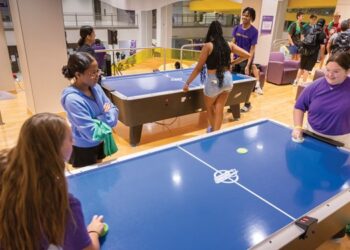The Final Exam is your chance to get advice and insights from experts in the industry. For the May/June issue, Campus Rec spoke with Jeff Huskey, the director of recreation at the University of California, Santa Barbara (UCSB).
1. How did you get started in the industry?
I actually started my career in collegiate athletics. Although I had some great experiences, it wasn’t a good fit for me. When considering a change, I talked to my friends who were working in Campus Recreation and I asked them about what they did. It sounded like a better fit for me and a closer match to my values. I took a leap and made the switch from athletics over to Campus Recreation. It was the smartest thing I have ever done.
2. How would you go about describing Campus Recreation at UCSB?
From a programming perspective we offer the typical programs. Our adventure program is very strong due to our location near many natural resources. We also have a very robust sport club program. We have a dedicated athletic training room with two full-time athletic trainers for our sport club program and a dedicated sports performance training room with a full-time strength and conditioning coach. Many of our clubs also have full-time coaches. Despite the abundance of resources and the regular success enjoyed in competition, we work hard to keep the focus of the program in line with our departmental values. We stress it is about the student experience, learning life skills, building lifelong friendships and positively representing their university.
We also have a very strong instructional program that offers classes you typically see more in a community recreation setting than in a collegiate recreation setting. For example, we offer pottery, sign language, guitar lessons, wine tasting and multiple types of dance classes. In addition to providing activities for students who might not otherwise interact with our department, this program generates a large amount of revenue that helps support other areas.
3. What has been one of the biggest challenges you have faced throughout your career?
As a director, I tend to spend the majority of my time working with the budget and human resource issues. Throughout my career, the most difficult challenges have always involved human resources, whether it is helping a staff member who has substance abuse issues; or working with a staff member who has been diagnosed with stage four cancer; or a staff member whose child committed suicide; or having to lay an employee off. The human resource issues are always the most challenging. Here at UCSB we have a large staff — 45 full-time, about 300 part-time and about 700 student employees — so there is always some kind of human resource issue, but it also means I get to work with and learn from a large, diverse group of people.
4. What has been one of the biggest accomplishments of your career?
I have been lucky enough throughout my career to have often been in the right place at the right time and have been involved in multiple facility projects. It would be easy for me to point to one of these many facility projects as a tangible accomplishment, but I am most proud of the impact I have had on others. A hundred years from now no one will know I was here on this earth, but if during my time I was able to make even the smallest influence on someone else’s life, it makes it all worth it.
5. What is one lesson you have learned that other recreation professionals might benefit from?
I have had to learn many lessons — most of them the hard way — but if I had to pick one it would be to always hear all sides before making a decision. Often the story presented to me is not always the whole story or is a skewed version seen through one lens. They say, “There are two sides to every story and the truth is somewhere in between.” Gather all of the facts and different perspectives whenever possible before making a decision or being sucked into an emotional response.
6. What is one fun fact about yourself others may not know?
I am a naturalized citizen. I was born in Germany while my father was in the U.S. Air Force. Generally, military children born on a U.S. base overseas automatically become a U.S. citizen. For some reason I was not born on the base, so I received a German birth certificate and had to be naturalized after my parents returned to the States.










